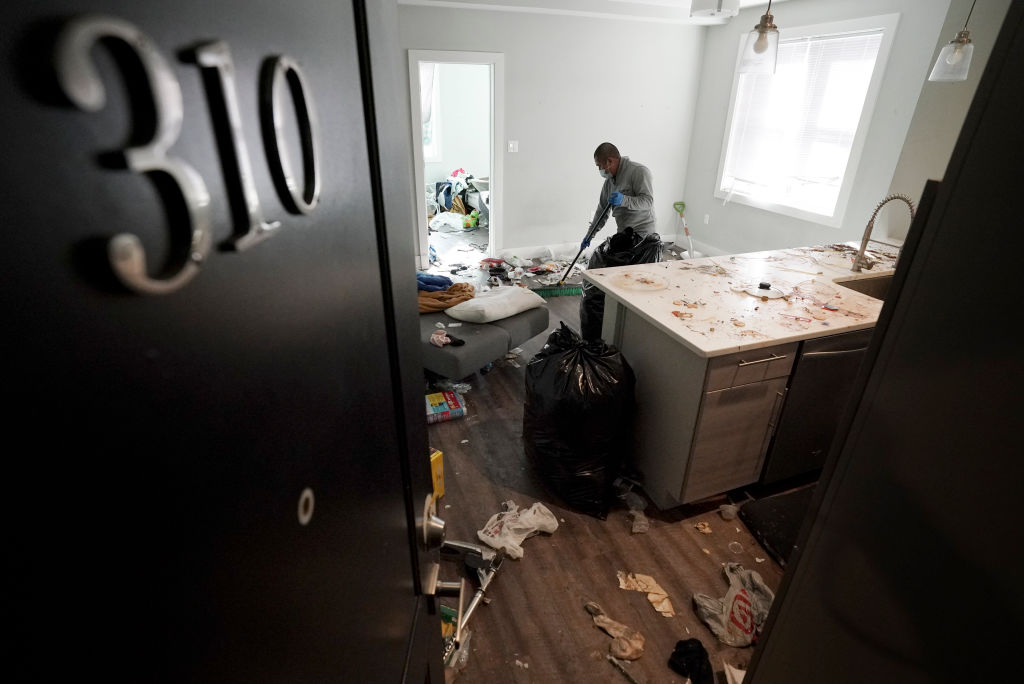Adele Andaloro says she was simply trying to remove squatters who had taken up residence in a home she owned, yet she was the one who got arrested last month after she called the police. The New York incident is just one story among many drawing attention to “squatters’ rights”: people settling themselves into a vacant home and claiming legal entitlement to remain indefinitely.
Technically, “squatters’ rights” do not exist—no law purports to intentionally protect squatters, and property owners (theoretically) have a constitutionally protected right to exclude unwelcome visitors from their property. Rather “squatters’ rights” refer to (and often conflate) two different things: adverse possession and the abuse of ostensibly legitimate tenant protections by bad actors.
Under the traditional legal doctrine of adverse possession, occupying a property for a sufficient length of time can convey ownership. This is no new or novel policy idea—the basic concept can be traced all the way back to the Romans. But nor does it come into play in the vast majority of “squatter” cases featured in the news or on social media, because the requirements for adverse possession are typically steep: New York requires the adverse possessor occupy the land for 10 years; California requires only five; Maryland requires 20. And there are usually additional requirements: In New York the adverse possessor must produce documentation purporting to entitle them to the property, such as a deed they thought was legitimate (but turns out to be invalid). Some jurisdictions, counterintuitively, require that the adverse possessor act in bad faith, rewarding deliberate thieves but not those who honestly but mistakenly believed they owned the land. California’s relatively lenient five-year minimum only applies if the squatter has been covering the property taxes.
Given the many years required, and other conditions, valid adverse possession claims by squatters are unusual—the doctrine comes up more often in boundary disputes, where otherwise legitimate landowners end up building on what turns out to be their neighbor’s property (and no one noticed for a decade or two). So if you own a mountain cabin, make a point to swing by at least every few years to see if anyone’s camping out. And If your neighbor puts his driveway across your lot you’ll want to make a stink about that sooner rather than later.
More commonly, “squatters’ rights” situations involve bad faith actors’ abuse of protections, such as New York City’s Tenants Bill of Rights, meant for legitimate tenants.
These situations can come in many forms—media reports and viral videos don’t always distinguish “pure” squatters (i.e., those who take up residence of a vacant property they’ve never had a valid claim to) from erstwhile legitimate tenants who overstay their welcome. And then there are the romantic partners and other hangers-on of previously legitimate tenants, who can also try to entrench their residency far past their legal right to be there (The Dispatch’s Kevin Williamson once recounted his own experience bringing eviction proceedings against someone declining to leave the family home.)
But who counts as a tenant? New York is particularly generous in this regard: Simply residing in a property for more than 30 days can potentially establish a landlord-tenant relationship, triggering tenants’ rights protections. In progressive cities like New York, San Francisco, and Washington, D.C., local politicians often favor the side of “labor” against “capital,” making it hard for even the most honest landlords to evict even the most obnoxious tenants.
The District of Columbia, for instance, has extensive protections for tenants. Under the Bill of Rights for D.C. tenants, you cannot be asked to leave simply because your lease expired. In most circumstances existing tenants are protected and rent controlled, such that a tenant is more or less entitled to a new lease, and the landlord cannot increase the rent more than 2 percent on an existing tenant, and then only 10 percent when the apartment changes over. This is why many newer buildings try gimmicks such as a 13-month lease with one month “free,” and that discount is prorated across the lease term, such that the tenant pays a lower monthly rent while the landlord gets a higher nominal rent with which to calculate the rent-controlled increases.
Meanwhile, the pro-squatter San Francisco Tenants Union provides advice on “Creating the appearance of a tenancy” by making the housing one illegally occupies look lived in, performing home improvement tasks in lieu of rent, and claiming the property owner’s failure to immediately call the cops on you as an implied contract to rent the property. Even if bad legal advice, such gimmicks can gum up the eviction-process works, requiring a court to sort it out—and all while the property owner covers a property’s expenses while the squatter lives rent-free.
Most notoriously, New York City’s “rent stabilization” policies entitle tenants to effectively perpetual tenancy, at rent-controlled rates, inheritable by not only their children but by anyone who manages to make friends with the tenant before they die—far from a restriction protecting against arbitrary evictions or a grace period to catch up on unpaid rent. The internet is full of how-to guides explaining how to take advantage of such policies to live in Manhattan on the cheap. The legality of these protections is controversial, and when the Supreme Court recently declined to take up a challenge to the New York regime, Justice Clarence Thomas issued a separate opinion implying skepticism that such an arrangement is constitutional at all (Disclosure: I filed a brief in support of that challenge).
As objectionable as many squatting situations can be, solutions can also be tricky because squatters exploit the legal protections intended to prevent otherwise responsible tenants from getting tossed out on the street by unreasonable landlords.
Consider Adele Andaloro’s case in March: She was arrested for attempting on her own initiative to evict people she claimed were squatters. Legally, she was in the wrong: New York is typical in barring landlords from evicting tenants themselves, nor can landlords legally induce tenants to leave by, say, cutting off the water or changing the locks. Evictions typically require a court order, obtained via what can be a lengthy and expensive legal process, and must be carried out by law enforcement rather than the landlord themselves.
Florida recently passed legislation targeting this problem, instead allowing law enforcement to remove squatters immediately at the request of a property owner. But it’s challenging for law enforcement, arriving at the scene to find an angry owner and defiant occupant, to adjudicate the dispute in the moment. Is the lease the squatter is waving around a fake, as the landlord says, or is the landlord obfuscating what is really a dispute with a legitimate tenant?
That’s the sort of factual question typically handled by court proceedings—but dragging out court proceedings is a key strategy used by squatters to live rent-free. And many housing courts face serious backlogs, delaying even the most legitimate attempts to evict squatters for months or years.
Some bias toward tenants may serve a purpose: While many landlords are small-time entrepreneurs trying to make ends meet themselves, the average rental property owner will have more resources, and a better understanding of the nuances of local housing regulation, than their renters. Indeed, the majority of property owners show up to court with a lawyer, while most tenants fly solo—if they show up to their court date at all. But then most tenants would probably lose with or without a lawyer, because they are in fact behind on rent or otherwise violating their leases.
There is a policy balance to be struck between protecting tenants from abusive landlords and protecting property owners from squatters abusing well-intended protections. At the moment, many jurisdictions might not have found the right balance.





Please note that we at The Dispatch hold ourselves, our work, and our commenters to a higher standard than other places on the internet. We welcome comments that foster genuine debate or discussion—including comments critical of us or our work—but responses that include ad hominem attacks on fellow Dispatch members or are intended to stoke fear and anger may be moderated.
With your membership, you only have the ability to comment on The Morning Dispatch articles. Consider upgrading to join the conversation everywhere.